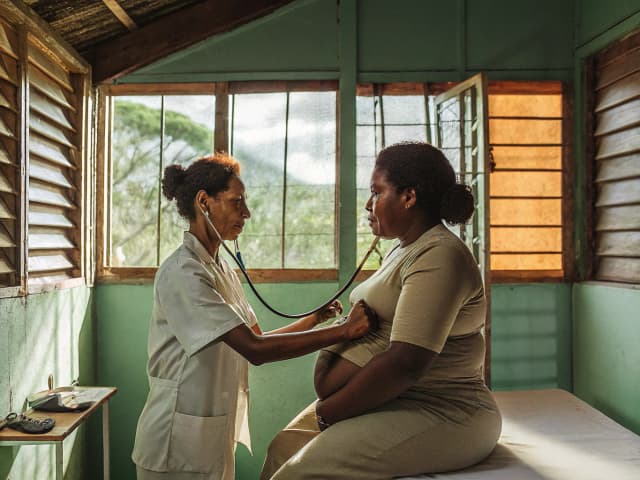Health & Public Health

Prenatal multivitamins.
Establishes a new chapter regulating prenatal vitamins with heavy metal testing and misdemeanor penalties. Commences heavy metal testing of every lot by January 1, 2027 at proficient labs. Brand owners must publicly disclose per-lot heavy metal data and supplement facts online. Mandates packaging and online disclosures by 2030 and bans noncompliant products.
Prenatal multivitamins.

Establishes a new chapter regulating prenatal vitamins with heavy metal testing and misdemeanor penalties. Commences heavy metal testing of every lot by January 1, 2027 at proficient labs. Brand owners must publicly disclose per-lot heavy metal data and supplement facts online. Mandates packaging and online disclosures by 2030 and bans noncompliant products.

California Children’s Services Program: county designation.
Authorizes counties under 2,000 to designate another county to administer CCS. Requires mutual agreement, standard compliance, and neither county be a Whole Child Model. Requires the department to adopt regulations and written county agreements, preserving therapy. Shifts CCS services to Medi-Cal in Whole Child Model counties, eligibility remains with the county.
California Children’s Services Program: county designation.

Authorizes counties under 2,000 to designate another county to administer CCS. Requires mutual agreement, standard compliance, and neither county be a Whole Child Model. Requires the department to adopt regulations and written county agreements, preserving therapy. Shifts CCS services to Medi-Cal in Whole Child Model counties, eligibility remains with the county.

Health facilities.
Establishes a new division to bar private equity groups and hedge funds from influencing clinical care. Prohibits interference with diagnostics, referrals, care options, and billing decisions. Authorizes the AG to seek injunctive relief, recover costs, and void prohibited terms. Enforcement relies on the attorney general; no private right of action is provided.
Health facilities.

Establishes a new division to bar private equity groups and hedge funds from influencing clinical care. Prohibits interference with diagnostics, referrals, care options, and billing decisions. Authorizes the AG to seek injunctive relief, recover costs, and void prohibited terms. Enforcement relies on the attorney general; no private right of action is provided.

Alcohol and other drug programs.
Enacts John’s Law to tighten death-investigation reporting and enforcement. Requires a 30-day post-incident update of new information. Authorizes deficiency notices for licensing violations found during investigations. Permits informal guidance via all-county letters to implement provisions.
Alcohol and other drug programs.

Enacts John’s Law to tighten death-investigation reporting and enforcement. Requires a 30-day post-incident update of new information. Authorizes deficiency notices for licensing violations found during investigations. Permits informal guidance via all-county letters to implement provisions.

Department of Health Care Access and Information.
Requires annual reporting on whether coverage starts at hire with no waiting period. Requires reporting of waiting period length by employee classification when applicable. DHCAI distributes forms, integrates data, and posts results annually on its website. Uses 12 classifications and six waiting period buckets.
Department of Health Care Access and Information.

Requires annual reporting on whether coverage starts at hire with no waiting period. Requires reporting of waiting period length by employee classification when applicable. DHCAI distributes forms, integrates data, and posts results annually on its website. Uses 12 classifications and six waiting period buckets.

Optometry.
Makes technical changes to update the examination name.
Optometry.

Makes technical changes to update the examination name.

Board of Psychology and Board of Behavioral Sciences.
Extends operation of psychology and behavioral health boards through 2030. Permits out-of-state or Canadian psychologists to provide CA services for up to 30 days with disclosures. Requires foreign-degree evaluations to prove equivalence for licensure in CA. Expands continuing education and adds mandatory training in aging, abuse, and human sexuality for licensees and registrants.
Board of Psychology and Board of Behavioral Sciences.

Extends operation of psychology and behavioral health boards through 2030. Permits out-of-state or Canadian psychologists to provide CA services for up to 30 days with disclosures. Requires foreign-degree evaluations to prove equivalence for licensure in CA. Expands continuing education and adds mandatory training in aging, abuse, and human sexuality for licensees and registrants.

Controlled substances: human chorionic gonadotropin.
Aims to remove hCG from Schedule III controlled substances. However the enacted language retains a special exemption for hCG, creating ambiguity. Provides no new enforcement mechanisms or penalties. Provides no explicit funding or effective date in the bill text.
Controlled substances: human chorionic gonadotropin.

Aims to remove hCG from Schedule III controlled substances. However the enacted language retains a special exemption for hCG, creating ambiguity. Provides no new enforcement mechanisms or penalties. Provides no explicit funding or effective date in the bill text.

Privacy: health data: location and research.
Makes technical changes to privacy rules; primarily nonsubstantive updates.
Privacy: health data: location and research.

Makes technical changes to privacy rules; primarily nonsubstantive updates.

Pupil health: epinephrine delivery systems: schoolsites and childcare programs.
Requires epinephrine delivery systems, not auto-injectors, at schools and childcare. Expands storage and stocking duties to all LEA sites and subsidized childcare. Establishes training, notices to staff, and liability protections for volunteers. Allows private schools to opt in without state funds.
Pupil health: epinephrine delivery systems: schoolsites and childcare programs.

Requires epinephrine delivery systems, not auto-injectors, at schools and childcare. Expands storage and stocking duties to all LEA sites and subsidized childcare. Establishes training, notices to staff, and liability protections for volunteers. Allows private schools to opt in without state funds.

Health providers: medical chaperones.
Mandates medical chaperones for sensitive ultrasound exams across clinics and hospitals. Requires notice of chaperone availability by hard copy, electronic, or verbal with records. Authorizes providers to require a chaperone and to decline without one, with presence documented. Operative January 1, 2027, violations are crimes, local program with no funding.
Health providers: medical chaperones.

Mandates medical chaperones for sensitive ultrasound exams across clinics and hospitals. Requires notice of chaperone availability by hard copy, electronic, or verbal with records. Authorizes providers to require a chaperone and to decline without one, with presence documented. Operative January 1, 2027, violations are crimes, local program with no funding.

State Fire Marshal: personal protective equipment: battery fires.
Establishes a working group to study PPE for lithium-ion battery fires. Requires SBFS, academia, safety experts, and a DOSH representative to join. Delivers PPE recommendations to the Legislature by September 1, 2026. Sets sunset by 2031 and makes the reporting obligation inoperative by 2030.
State Fire Marshal: personal protective equipment: battery fires.

Establishes a working group to study PPE for lithium-ion battery fires. Requires SBFS, academia, safety experts, and a DOSH representative to join. Delivers PPE recommendations to the Legislature by September 1, 2026. Sets sunset by 2031 and makes the reporting obligation inoperative by 2030.

Registered environmental health specialists.
Extends supervision period for environmental health trainees to five years. Expands scope of practice to include body art and medical waste. Reforms the committee by making the director executive officer and expanding membership. Requires online public registry of all registered specialists and trainees within 90 days after examination.
Registered environmental health specialists.

Extends supervision period for environmental health trainees to five years. Expands scope of practice to include body art and medical waste. Reforms the committee by making the director executive officer and expanding membership. Requires online public registry of all registered specialists and trainees within 90 days after examination.

Community Assistance, Recovery, and Empowerment (CARE) Court Program.
Expands CARE Act eligibility and referrals across more crimes and courts. Allows prima facie determinations without full hearings and adds graduation/extension options. Expands referral sources to CARE Act courts from misdemeanors and felonies. Requires annual data reports with health equity analysis and public de-identified data.
Community Assistance, Recovery, and Empowerment (CARE) Court Program.

Expands CARE Act eligibility and referrals across more crimes and courts. Allows prima facie determinations without full hearings and adds graduation/extension options. Expands referral sources to CARE Act courts from misdemeanors and felonies. Requires annual data reports with health equity analysis and public de-identified data.

End of Life Option Act: sunset.
Repeals the End of Life Option Act sunset, extending its operation indefinitely. Keeps the End of Life Option Act's eligibility, procedures, and penalties unchanged. Creates a state-mandated local program with ongoing local costs, no state funding. Leaves no explicit effective date; follows standard legislative practice.
End of Life Option Act: sunset.

Repeals the End of Life Option Act sunset, extending its operation indefinitely. Keeps the End of Life Option Act's eligibility, procedures, and penalties unchanged. Creates a state-mandated local program with ongoing local costs, no state funding. Leaves no explicit effective date; follows standard legislative practice.

Radiologic technologists: venipuncture: direct supervision.
Expands direct supervision to include telepresence for venipuncture. Requires safety protocols and on-site licensed responders for telepresence. Requires access to patient imaging records for remote supervision. Maintains 10 hours of instruction and 10 supervised punctures.
Radiologic technologists: venipuncture: direct supervision.

Expands direct supervision to include telepresence for venipuncture. Requires safety protocols and on-site licensed responders for telepresence. Requires access to patient imaging records for remote supervision. Maintains 10 hours of instruction and 10 supervised punctures.

Coverage for behavioral health visits.
Mandates large-group plans cover 12 wildfire-related behavioral health visits for policies issued on or after Jan 1, 2026. Prohibits utilization review for these 12 visits and applies regardless of provider network. Requires noncontracting providers to charge only in-network cost-sharing and have deductible accrual. Requires plans to notify affected enrollees within implementation or 30 days after wildfire declarations.
Coverage for behavioral health visits.

Mandates large-group plans cover 12 wildfire-related behavioral health visits for policies issued on or after Jan 1, 2026. Prohibits utilization review for these 12 visits and applies regardless of provider network. Requires noncontracting providers to charge only in-network cost-sharing and have deductible accrual. Requires plans to notify affected enrollees within implementation or 30 days after wildfire declarations.

Social media: warning labels.
Requires black box warnings on covered platforms to warn minors about mental health harms. Initial warning on first access: 10 seconds, 25% screen, dismissible. After 3 hours: 30 seconds, 75% screen, non-bypassable, hourly thereafter. Operative date 2027; no private action; applies to addictive platforms.
Social media: warning labels.

Requires black box warnings on covered platforms to warn minors about mental health harms. Initial warning on first access: 10 seconds, 25% screen, dismissible. After 3 hours: 30 seconds, 75% screen, non-bypassable, hourly thereafter. Operative date 2027; no private action; applies to addictive platforms.

Health facilities: administrative penalties.
Establishes tiered penalties for serious jeopardy violations with a three-year reset. Defines on-call list and says only on-call or float staff count toward exhaustion. Counts violations on separate days as separate penalties. Imposes up to $25,000 per non-IJ violation and protects small and rural hospitals.
Health facilities: administrative penalties.

Establishes tiered penalties for serious jeopardy violations with a three-year reset. Defines on-call list and says only on-call or float staff count toward exhaustion. Counts violations on separate days as separate penalties. Imposes up to $25,000 per non-IJ violation and protects small and rural hospitals.

Rural hospitals: standby perinatal services.
Establishes a 10-year pilot for standby perinatal services in up to five rural CAHs. First two sites must be nonprofit in Humboldt and Plumas. Requires 24/7 on-site coverage within 30 minutes and a standby space. Sets data collection, quarterly reporting, public evaluation, enforcement with no statewide funding.
Rural hospitals: standby perinatal services.

Establishes a 10-year pilot for standby perinatal services in up to five rural CAHs. First two sites must be nonprofit in Humboldt and Plumas. Requires 24/7 on-site coverage within 30 minutes and a standby space. Sets data collection, quarterly reporting, public evaluation, enforcement with no statewide funding.

Health care coverage: prescription hormone therapy and nondiscrimination.
Requires coverage of a 12-month supply of FDA-approved prescription hormone therapy dispensed at once. Prohibits limiting to under 12 months; allows exceptions for patient request or shortage. Establishes nondiscrimination protections based on sex, pregnancy, gender identity, and traits. Enacts immediately as an emergency statute and expires January 1, 2035 with managed care exempt.
Health care coverage: prescription hormone therapy and nondiscrimination.

Requires coverage of a 12-month supply of FDA-approved prescription hormone therapy dispensed at once. Prohibits limiting to under 12 months; allows exceptions for patient request or shortage. Establishes nondiscrimination protections based on sex, pregnancy, gender identity, and traits. Enacts immediately as an emergency statute and expires January 1, 2035 with managed care exempt.

Vital records: birth certificates.
Establishes parental birthplace in confidential birth data by July 1, 2027. Keeps confidential medical and social data protected under existing privacy rules. Allows parents to object to race, occupation, or education data in the confidential portion. Requires physicians to use a separate confidential worksheet and State Registrar oversight.
Vital records: birth certificates.

Establishes parental birthplace in confidential birth data by July 1, 2027. Keeps confidential medical and social data protected under existing privacy rules. Allows parents to object to race, occupation, or education data in the confidential portion. Requires physicians to use a separate confidential worksheet and State Registrar oversight.

Public health: Two-Spirit, Transgender, Gender Nonconforming, and Intersex Wellness and Equity Fund.
Renames the fund to the 2TGI Wellness and Equity Fund to expand grants. Expands grants to include workforce, housing, resettlement, youth programs, and tribal partnerships. Requires hospitals to partner with a 2TGI-serving organization. Broadens health care to include mental health and therapeutic arts.
Public health: Two-Spirit, Transgender, Gender Nonconforming, and Intersex Wellness and Equity Fund.

Renames the fund to the 2TGI Wellness and Equity Fund to expand grants. Expands grants to include workforce, housing, resettlement, youth programs, and tribal partnerships. Requires hospitals to partner with a 2TGI-serving organization. Broadens health care to include mental health and therapeutic arts.

Ken Maddy California Cancer Registry.
Establishes statewide and regional registries and infrastructures. Requires an implementation and funding plan by January 1, 2027. Authorizes regional designations and flexible contracting for registry operations. Strengthens reporting rules, confidentiality, penalties for refusals, and cost recovery.
Ken Maddy California Cancer Registry.

Establishes statewide and regional registries and infrastructures. Requires an implementation and funding plan by January 1, 2027. Authorizes regional designations and flexible contracting for registry operations. Strengthens reporting rules, confidentiality, penalties for refusals, and cost recovery.

Inmates: mental health.
Authorizes emergency antipsychotic treatment for inmates found incompetent after misdemeanors. Allows emergency antipsychotics before capacity hearings for a limited period. Requires sixty-day reviews with affidavits and a ninety-day cap on orders. Sunsets the authority after a fixed term and preserves habeas rights.
Inmates: mental health.

Authorizes emergency antipsychotic treatment for inmates found incompetent after misdemeanors. Allows emergency antipsychotics before capacity hearings for a limited period. Requires sixty-day reviews with affidavits and a ninety-day cap on orders. Sunsets the authority after a fixed term and preserves habeas rights.